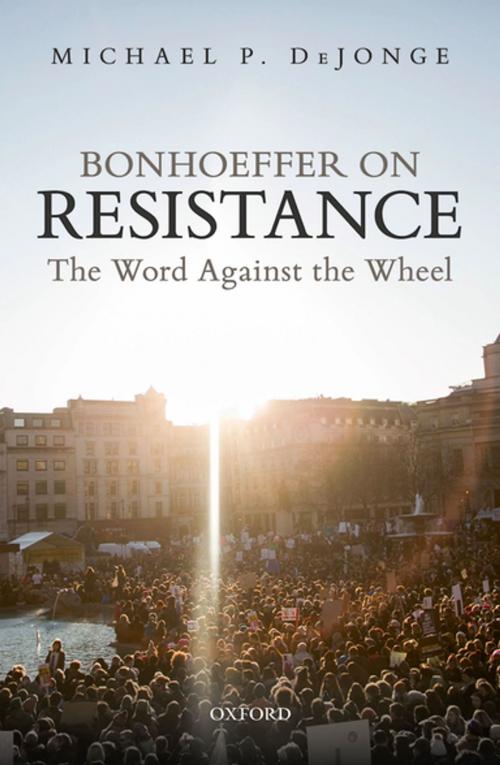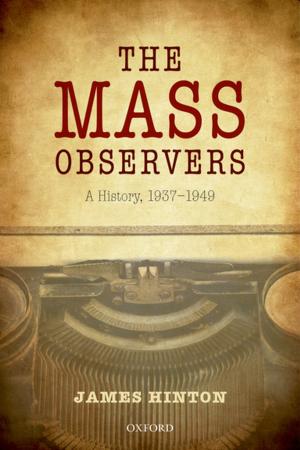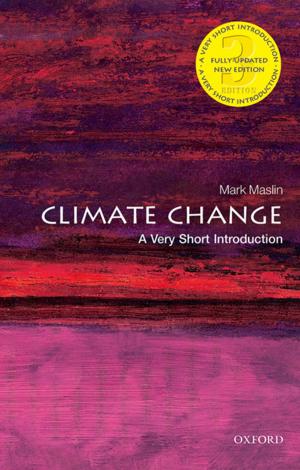Bonhoeffer on Resistance
The Word Against the Wheel
Nonfiction, Religion & Spirituality, Christianity, Church, Church & State, Social & Cultural Studies, Political Science| Author: | Michael P. DeJonge | ISBN: | 9780192557896 |
| Publisher: | OUP Oxford | Publication: | August 17, 2018 |
| Imprint: | OUP Oxford | Language: | English |
| Author: | Michael P. DeJonge |
| ISBN: | 9780192557896 |
| Publisher: | OUP Oxford |
| Publication: | August 17, 2018 |
| Imprint: | OUP Oxford |
| Language: | English |
Bonhoeffer thought and wrote a great deal about political life, but he did so neither as a political theorist nor a political activist but rather as a Christian pastor and theologian. Most of what he said about political resistance was said as a theologian, as one speaking on behalf of the church. For this reason, his thinking about political resistance can only be understood in the broader context of his theology. Bonhoeffer on Resistance provides an account of Bonhoeffer's resistance thinking as a whole. This involves placing his thinking about violent political resistance in the context of his thinking about resistance of all kinds; placing his thinking about political resistance of all kinds into the context of his thinking about political life in general; and, ultimately, placing his thinking about political life in the broader context of his theology, his thinking about the whole world and God's relationship to it. To establish the conceptual background necessary for understanding Bonhoeffer's resistance thinking, Michael P. DeJonge begins with a brief account of the theological story in which Bonhoeffer imbeds his account of political life: the story of God's creation of the world, the fall of that world into sin, and the redemption of that world in Christ. He introduces some specifically Lutheran accents to Bonhoeffer's theology that are essential for understanding his political vision, such as the doctrine of justification and the distinction between law and gospel. DeJonge then transitions from Bonhoeffer's theology into his political thinking by presenting the basic conceptual structures he employs when thinking through most political issues. Two important agents or institutions in political life are church and state, and DeJonge presents Bonhoeffer's account of these in light of the material presented in the previous chapters. The volume then presents Bonhoeffer's resistance thinking and activity, which can be considered from two overlapping perspectives, one chronological and the other systematic. This study shows that Bonhoeffer has a systematic, differentiated, and well-developed vision of political activity and resistance.
Bonhoeffer thought and wrote a great deal about political life, but he did so neither as a political theorist nor a political activist but rather as a Christian pastor and theologian. Most of what he said about political resistance was said as a theologian, as one speaking on behalf of the church. For this reason, his thinking about political resistance can only be understood in the broader context of his theology. Bonhoeffer on Resistance provides an account of Bonhoeffer's resistance thinking as a whole. This involves placing his thinking about violent political resistance in the context of his thinking about resistance of all kinds; placing his thinking about political resistance of all kinds into the context of his thinking about political life in general; and, ultimately, placing his thinking about political life in the broader context of his theology, his thinking about the whole world and God's relationship to it. To establish the conceptual background necessary for understanding Bonhoeffer's resistance thinking, Michael P. DeJonge begins with a brief account of the theological story in which Bonhoeffer imbeds his account of political life: the story of God's creation of the world, the fall of that world into sin, and the redemption of that world in Christ. He introduces some specifically Lutheran accents to Bonhoeffer's theology that are essential for understanding his political vision, such as the doctrine of justification and the distinction between law and gospel. DeJonge then transitions from Bonhoeffer's theology into his political thinking by presenting the basic conceptual structures he employs when thinking through most political issues. Two important agents or institutions in political life are church and state, and DeJonge presents Bonhoeffer's account of these in light of the material presented in the previous chapters. The volume then presents Bonhoeffer's resistance thinking and activity, which can be considered from two overlapping perspectives, one chronological and the other systematic. This study shows that Bonhoeffer has a systematic, differentiated, and well-developed vision of political activity and resistance.















